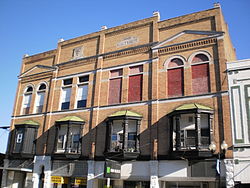Hartford City Courthouse Square Historic District
|
Hartford City Courthouse Square Historic District
|
|

One of the buildings on Main Street in the district
|
|
| Location | Roughly bounded by Franklin, Walnut, Water and Monroe Sts., Hartford City, Indiana |
|---|---|
| Coordinates | 40°27′5″N 85°22′5″W / 40.45139°N 85.36806°WCoordinates: 40°27′5″N 85°22′5″W / 40.45139°N 85.36806°W |
| Area | 19 acres (7.7 ha) |
| Architect | Arthur LaBelle; Burt French; P.J. Loney; others |
| Architectural style | Italianate, Romanesque Revival, Renaissance Revival, Queen Anne, Art Deco |
| NRHP Reference # | 06000522 |
| Added to NRHP | June 21, 2006 |
The Hartford City Courthouse Square Historic District is located in Hartford City, Indiana. Hartford City has a population of about 7,000 and is the county seat of Blackford County and the site of the county courthouse. The National Park Service of the United States Department of the Interior added the Hartford City Courthouse Square Historic District to the National Register of Historic Places on June 21, 2006 — meaning the buildings and objects that contribute to the continuity of the district are worthy of preservation because of their historical and architectural significance. The District has over 60 resources, including over 40 contributing buildings, over 10 non-contributing buildings, 1 contributing object (a World War I statue), 8 non-contributing objects, and two other buildings that are listed separately in the National Register.
Much of the District's significance relates to the discovery of natural gas in the east central region of Indiana. The discovery led to a regional economic boom known as the Indiana Gas Boom. Beginning in the late 1880s and lasting for about 15 years, the Gas Boom changed the economy and the appearance of the region. The Hartford City Courthouse Square Historic District is situated in what was the center of Hartford City in the 19th and 20th centuries, and most of the buildings within the District were constructed during the Gas Boom era. The buildings within the District were built in several architectural styles, including Commercial Italianate, Romanesque Revival, Renaissance Revival, and others. Many of the buildings' exteriors have not been changed from their original appearance.
...
Wikipedia



